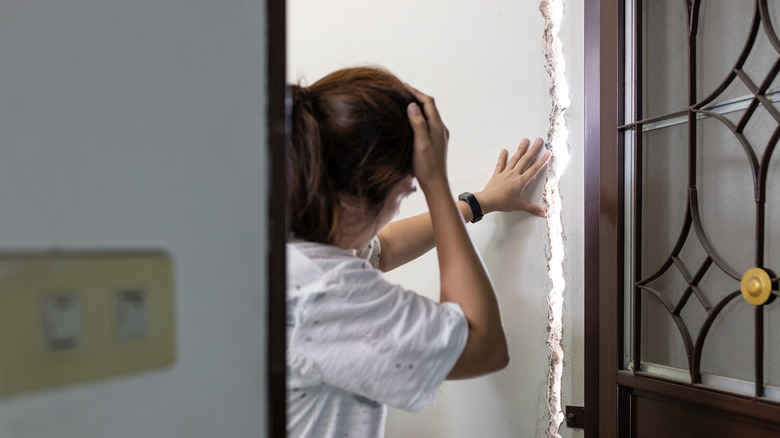The Downsides Of Being Gifted A Home On Extreme Makeover: Home Edition
"Extreme Makeover: Home Edition" moved its first bus in the early 2000s and quickly became a Sunday night staple for U.S. families. It was such a phenomenon that at its height it averaged nearly 16 million viewers in the 2005 to 2006 season. The show's premise was simple but lofty: a team would redesign and build a new home for a family in need, all within one week. Communities would come together to help construct large homes, and then they'd cheer and revel in the big reveal. But with the show's extreme fame came many questions, concerns, and a lot of criticism. Viewers questioned the show's ethics and doubted the team's ability to make functional housing within a week. Now that time has passed and the show has gone through two revivals, the downsides of being gifted a home on "Extreme Makeover: Home Edition" have been revealed. Quick turnaround times left some homes barely functional while some homeowners couldn't keep up with the increased mortgage payments and utility costs that followed.
Families on the show were often in need due to major life events like sudden familial death, medical bills, and unexpected weather catastrophes. The show seemed to offer a lifeline and inspiration that couldn't be matched. However, homeowners who lived paycheck to paycheck were surprised by the increased costs that priced them out of the houses they'd called home for years. While the goal of the show seemed noble, the execution was faulty and, at times, counterproductive.
Rushed work lead to structural problems
Renovating a home in a week is an incredible feat; that's why the crew called upon the community for extra laborers. With such an unprecedented goal, fans of the show wondered if the homes were safe. One project manager told the Chicago Tribune that an inspector was always on-site to ensure proper construction. Additionally, many components were organized months before the actual renovations, which meant less room for error on some key aspects. However, just because many homes were safe and sound doesn't mean they remained that way. The show used vetted local construction companies but would then leave homeowners to fix issues on their own.
A quick visit to Reddit's "Ask Me Anything" board will provide multiple threads about the realities of getting a home from "Extreme Makeover: Home Edition." In the threads, many people shared their experiences or those of their friends and family. Some detail what it was like to work on one of the homes and others detail what happened to the families and their gifted homes post-makeover. Though several posts praise the show for its ability to get things done in a restrictive timeframe, multiple construction workers either took issue or revealed problems with the rapid set foundation. One Redditor recounted a friend's struggle to get the show to fix construction issues, like problems with their home's foundation. The user alleges that the family was told, "you got this for free, fix it yourself."
Increased costs put burdens on homeowners
Though the modifications and redesign were free for the families, the costs that followed fell solely on homeowners. The increased size of the homes meant higher utility costs because a larger home requires more power, temperature control, and water. So, the elevated costs put a strain on those who were already struggling to pay their bills pre-renovation. According to WSJ, a family in Arizona went from paying $300 for power to a whopping $1800 every month due to renovations and additions like a home theater.
Mortgages also rose, forcing some homeowners to sell or refinance their customized homes. Others endured foreclosure after being unable to keep up with their new mortgage. The Lansing State Journal reported that Arlene Nickless of Michigan saw her home remodeled after the death of her husband. Though she doesn't blame the show itself, Nickless faced foreclosure after her mortgage nearly quadrupled from $30,000 to $113,000. Nickless, who was already struggling with her mortgage before the renovations, could not meet the rising mortgage interest rates because of the increased taxes and insurance, and she is not alone. Families in Atlanta and St. Augustine also found the increased costs to be too much.


